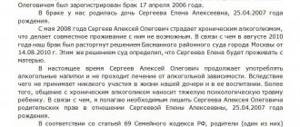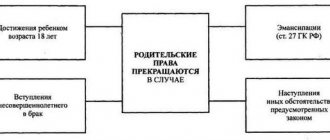Deprivation of parental rights to the mother of a child is not a pleasant phenomenon, first of all, for the child himself. However, a situation often arises when a mother does not look after her child, does not care for him, does not educate him, feeds him poorly, does not educate him, or treat him. In such cases, the question of depriving the mother of parental rights to the child may arise.
This situation usually arises in cases where the mother suffers from alcohol or drug addiction. The grounds for depriving a mother of her rights to a child must be truly compelling. The Family Code clearly states what can serve as a reason for deprivation of parental rights. If it is necessary to deprive a father of parental rights to a child, we suggest reading the article: “How to deprive a father of parental rights: grounds,” which discusses the features of this procedure.
Grounds for deprivation of parental rights of a mother
The Family Code of the Russian Federation lists the reasons why guardianship authorities and judicial authorities are obliged to deprive the mother of parental rights.
| No. | Reasons |
| 1 | Persistent reluctance to raise and support children: pay child support, care for the child, take an interest in his education, health |
| 2 | Refusal to abandon a child in the maternity ward of a hospital, as well as refusal to pick him up from an educational, medical or social institution |
| 3 | Abuse of the rights of family members - use of child benefits, alimony for one’s needs |
| 4 | Alcoholism and drug addiction of the mother, established by relevant documents in a medical institution |
| 5 | Committing a criminal offense against the life and health of close relatives or a child |
These reasons are exhaustive. The court has no right to use other arguments to deprive the mother of parental rights.
Example . Often fathers scare the child's mother that they will deprive her of her rights and take the child for themselves. In most cases, these are empty threats, because the child is always left with the mother, even if she does not work. Only in the exceptional cases listed above, the child can be handed over to the father, and the mother can be deprived of all rights to her child.
It is extremely difficult to deprive a mother of parental rights. Most often, such measures of influence are awarded to generally dysfunctional families, when both parents are deprived of their rights at once. There are much fewer cases when a mother is deprived of her rights to a child, and the latter remains with the father.
Arbitrage practice
When considering claims for deprivation of maternal rights, the court makes a decision based on the evidence provided. That is why the trial must be preceded by careful preparation. It is advisable to involve specialists:
- school or kindergarten attended by the minor;
- district police officer or police officers;
- social service employees;
- health workers;
- child psychologist, etc.
Example
Mikhail Novikov filed a lawsuit to deprive her ex-wife Irina of parental rights. In the statement of claim, he explained that after the divorce, the mother stopped raising their joint son, Andrei. The child walks around dirty, unkempt, and Mikhail often notices signs of beatings on the boy’s body. At the trial, the child’s class teacher confirmed the father’s testimony and added that the boy often comes to school sleep-deprived and with unfinished homework.
Defendant Irina Novikova explained in court that she had a very difficult time breaking up with her husband, and as a result she developed a mental illness. She presented a certificate from a psychiatrist confirming her words. The certificate also stated that the woman was undergoing intensive treatment, which could completely restore the woman’s mental health.
In court, the plaintiff changed the claims from deprivation of maternal rights to their limitation. The court granted the plaintiff's new claims. The boy temporarily moved to live with his father, who did not interfere with his son’s communication with his mother, but was constantly present.
Six months later, Irina was completely cured and went to court to restore parental rights in full. The court granted her request.
Procedure and order
The procedure for depriving the mother of rights is similar to the mechanism of influence on the father. The issue of depriving a mother of her rights to her child is considered in court.
You can file a claim:
- father of the child;
- legal guardian or trustee;
- guardianship authorities or prosecutor in the interests of the minor.
Who deprives a mother of her rights to her child?
The only body that has the right, on the basis of law, to deprive children of rights is the court. Guardianship authorities, contrary to the opinion of the majority, do not have such a prerogative. Their responsibility is to submit an application to the court and participate in court proceedings, collect evidence, and help the second parent protect their rights.
Guardianship authorities always protect the family, so when they see a difficult situation that threatens the life and health of a child, they do not stand aside. They prepare a conclusion about the unacceptable living conditions of the children and act on the initiative of the second parent or the court.
However, there are situations when government agencies try to interfere in the lives of wealthy families. In such cases, a lawyer will be able to help defend their interests for the child.
Example . Former husband Sergei N. filed a lawsuit against the mother of their common child, Alina N., demanding deprivation of her parental rights. In the lawsuit, the man stated that the woman does not work, has no source of livelihood, often leaves the child with her grandmother, and does not participate in raising her.
The guardianship authorities, having gone to the place where the mother and child lived, found that the child had everything necessary for development: clothes, food, his own room, toys. The mother works unofficially, sometimes on night shifts, so she is forced to involve the child’s grandmother in looking after the baby.
The child's father's claim was completely denied.
Filling out an application for deprivation of parental rights of a mother
A document that contains a demand for deprivation of parental rights is called a statement of claim for deprivation of a mother's parental rights to a minor. It is drawn up within the framework of the Civil Procedure Code (Articles 131-132 of the Code of Civil Procedure of the Russian Federation) and is considered only by the court.
The statement of claim must include the following information:
- name of the court, parties, their exact addresses;
- circumstances of the case: information about the marriage, relationship between the child and the parent who is being deprived of rights;
- information about the place of residence of the child and the “problem” mother;
- conditions for depriving a mother of her rights to a child;
- specific actions of the mother that contradict current family legislation and entail loss of rights;
- evidence and references to regulations;
- claim to court;
- date of preparation of the document, personal signature of the plaintiff and list of attachments.
Only a competent specialist will be able to correctly and based on the law draw up a statement in which he will competently and concisely outline the circumstances that worsen the child’s life. You can first consult with our lawyers completely free of charge!
When drafting it yourself, you can use the general sample claim for deprivation of the mother’s parental rights. But be careful - preparing documents yourself often leads to mistakes and may lead to denial of the claim.
Evidence base
At the legislative level, a complete ban is established on interference in the family life of citizens by anyone. Government agencies are no exception. However, there are cases where their intervention is permitted. These are cases of parents failing to fulfill their responsibilities in raising children.
In fact, the procedure for proving failure to fulfill one’s duties is a long and labor-intensive process.
An important role is played by:
- certificates from the place of work, previous, present.
- neighbors' testimony, certificates from clinics about the presence of addiction.
- conclusion of the guardianship authorities;
- information from the police;
- information about the mental health of parents.
This is only a small part of the evidence. Professional lawyers will be able to collect all the necessary documents in the shortest possible time and protect children from unfair treatment by the mother.
Duty
Plaintiffs are exempt from paying fees for claims to protect the rights and interests of minors.
A fee of 300 rubles will be collected from the defendant if the mother is successfully deprived of parental rights.
Required documents
When there are grounds for depriving the mother of her legal rights to the child, the plaintiff prepares an application and a package of documents to submit to the court. The evidence base must be complete and reliable, otherwise there is a chance of losing the meeting.
The following package of documents must be attached to the statement of claim:
- second copy of the claim;
- child's birth certificate;
- document on marriage and divorce (if any) of the minor’s parents;
- an extract from the house register stating that the child lives with his parents;
- characteristics of parents (from neighbors, supervisor, colleagues);
- characteristics of a minor (from an educational institution);
- a psychologist’s opinion on the child’s mental health (can be obtained through the guardianship authorities);
- an act recording the living conditions of a minor (drawn up by the guardianship authorities);
- certificate of the presence or absence of alimony debt (issued by the bailiff service);
- court verdict (if the woman was previously convicted of any crime, especially related to children);
- certificate confirming that the police were called;
- a doctor’s report on the child’s general condition and the presence of injuries;
- certificates attesting to the mental and physical health of the parents;
- title documents for the premises where the minor will live if he is left with the second parent;
- income certificates of both parents.
The court has the right to request other documentation that will help confirm the grounds for the claims being made.
Is it possible to take a child away from its mother without going to court?
The law provides that if there is a threat to both the health and life of a minor in general, he can be taken away without waiting for a court decision. This can be done by the guardianship authorities, who determine the whereabouts of the child and then apply to the court for deprivation of rights.
Most often, the child is handed over to either the second parent or a close relative, who will subsequently be appointed as a guardian. If there are no parents or relatives, then the child ends up in an orphanage.
A family deprivation lawyer will advise you on what cases are considered urgent, how you can prevent this, and also protect yourself from illegal actions of government bodies.
How to file a claim
As already mentioned, you need to start with confirmation. Having strong grounds in hand to deprive maternal rights, you can begin to draw up an act. If the mother does not live with the child or does not provide any care, you need to contact the guardianship authorities. They, in turn, will conduct an inspection and, if there is evidence confirming the irresponsibility of the parent, will register the family.
There are times when the mother is serving time in prison. To get out of this situation, you will need a certificate from the Federal Penitentiary Service. If the evidence for depriving the mother of her rights is a crime committed, then it is worth applying to the court for a certificate confirming the existence of a criminal case. As a last resort, a court verdict to initiate criminal liability will be required. Documents from medical institutions will help prove violent actions.
Evidence may also include:
- police certificates;
- diagnosis from a psychoneurological clinic;
- recording beatings in the hospital;
- complete description of the mother.
The presence of grounds is necessary, otherwise the trial will take more than one month, and perhaps the case will be completely lost. Judicial practice shows that the conclusions of third parties provide a great advantage.
Once the documents have been collected and the evidence is well founded, you can file a claim. The statement must be supported only by facts, without describing feelings and emotions. To submit, you will need to pay a state fee. However, the natural father is not required to pay the fee.
Limiting contact with children
Of course, there are situations when failure to fulfill the responsibility to raise and support children is the result of the illness of the parents. These include mental illnesses, due to which parents are not aware of what is happening.
Sometimes the reason for a mother’s inappropriate behavior is a difficult life situation. Regulatory legal acts give the court the opportunity in such cases to limit the child’s communication, removing him from the insane parent.
This is not yet a complete deprivation of rights, but it is already the first stage - the child can be sent to a guardian, and the mother will have the opportunity to prove her parental qualities over the next period of time.
Restoring parental rights
Russian laws are humane, therefore, subject to certain conditions, restoration of deprived rights is still possible.
The Family Code includes:
- changing the lifestyle of parents;
- recovery;
- change in attitude towards the child;
Important! All of the above can only be applied if the child has not been adopted. Adoption is possible after 6 months from the date the court decision enters into force. In the future, it will be almost impossible to cancel the adoption without the help of an experienced family lawyer
A family lawyer is necessary in such a situation, since it will not be easy to prove to the court that the parent’s life has really changed. Only a competent specialist with extensive practical experience can do this.








